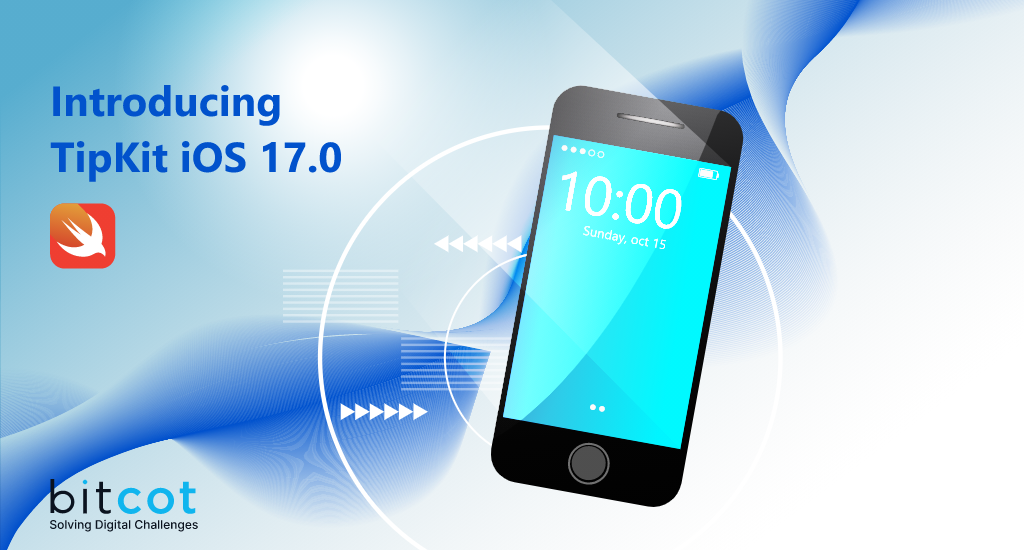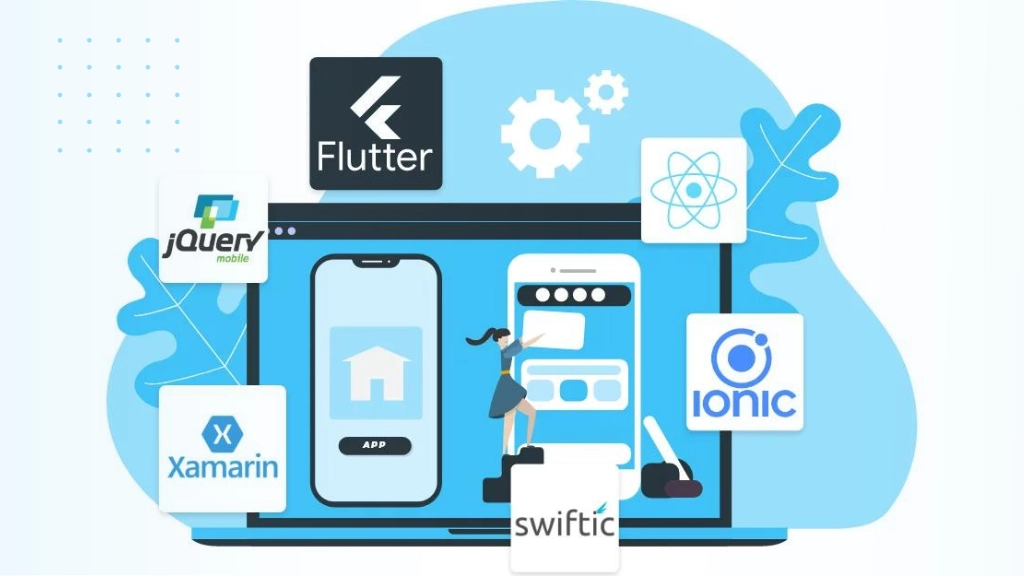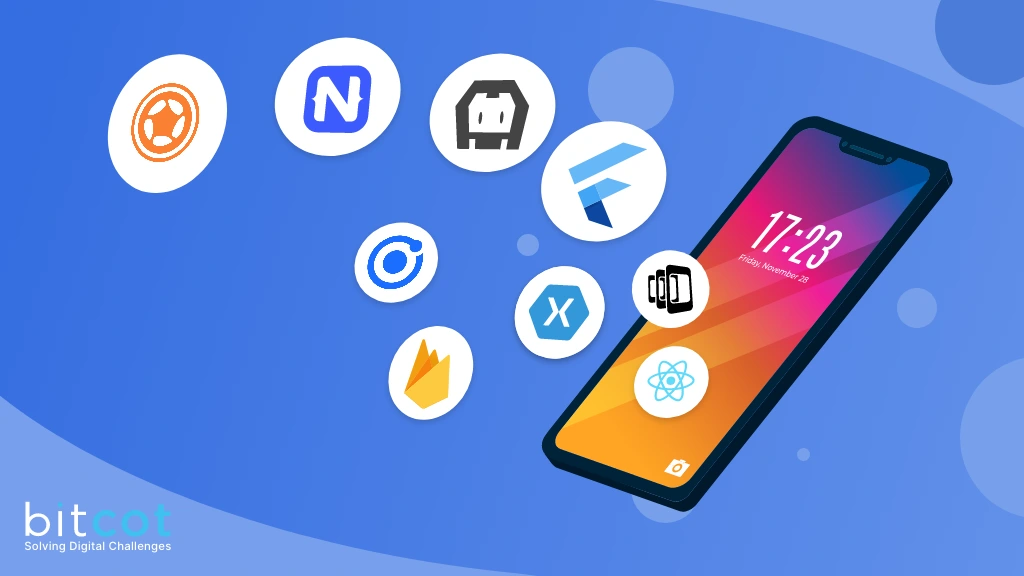
Businesses are increasingly challenged with the need to create mobile apps that can run on multiple platforms, particularly on Android and iOS. As a result, cross-platform mobile development solutions have gained popularity as one of the most sought-after software development trends.
Recent statistics from Statista reveal that as of the first quarter of 2021, there were 3.72 million mobile apps available on the Google Play Store and 2.58 million apps on the App Store. Android and iOS now account for 99% of the worldwide mobile operating system market. This highlights the importance of developing mobile apps that can run seamlessly on both platforms to reach a wider audience.
Also Read: Top 10 Cross Platform Mobile App Development Tools
What is Cross-Platform Mobile Development?
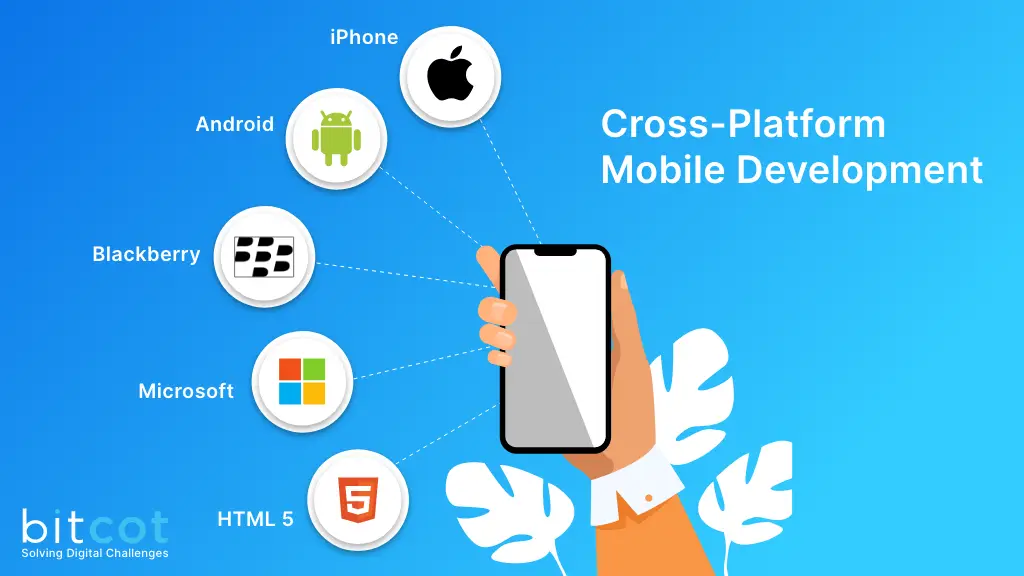
Cross-platform mobile development is the process of creating mobile applications that can run on multiple operating systems or platforms, such as iOS and Android, using a single codebase. Cross-platform mobile development allows developers to write code once and deploy it on different platforms instead of writing separate code for each platform.
To develop cross-platform software, developers use platform-agnostic technologies such as Dart, C#, and JavaScript for near-native cross-platform development and HTML, JavaScript, and CSS for hybrid development. These languages are not native to any operating system or device.
Hybrid and near-native applications can have a nearly native look and feel by combining native code with independent code suitable for multiple platforms. Developers can write the app logic code once and reuse it, making it possible to release the product quickly.
Cross-platform development has become increasingly popular in recent years due to its cost-effectiveness, ease of maintenance, and ability to reach a wider audience.
Common Myths About Cross-Platform Mobile App Development
Cross-platform mobile app development often needs clarity, with many myths and misconceptions floating around. In this article, we will debunk some of the most common myths about cross-platform mobile app development.
Myth 1: Cross-platform mobile apps are of poorer quality than native apps
One of the most common myths about cross-platform mobile app development is that the resulting apps are of inferior quality than native apps. The myth originated from the early days of cross-platform development when the technology was not matured and the performance was not up to the mark. However, advancements in technology have dramatically improved the performance of cross-platform development. Additionally, many successful cross-platform apps are in use today, such as Airbnb, Uber, and Instagram, to name a few.
Cross-platform development frameworks such as React Native, Xamarin, and Flutter offer excellent performance and native-like user experience, providing access to platform-specific features. In summary, cross-platform mobile apps are not of inferior quality compared to native apps.
Myth 2: Cross-platform mobile app development is more expensive than native app development
Another common myth about cross-platform mobile app development is that it is more expensive than native app development. This myth originated from the fact that cross-platform development requires different skills and expertise than native app development. However, the truth is that cross-platform development can be more cost-effective than native app development in the long run.
Cross-platform development frameworks allow developers to write code once and deploy it across multiple platforms, which saves time and effort. This can lead to significant cost savings, especially if you must develop and maintain multiple platform apps. Furthermore, cross-platform development frameworks offer a wide range of libraries and tools that can speed up the development process, further reducing costs.
Myth 3: Cross-platform mobile app development is not as flexible as native app development
The third myth about cross-platform mobile app development is that it is less flexible than native app development. The myth originated from the belief that cross-platform development frameworks may not support all the features and functionalities required by businesses.
However, cross-platform development frameworks offer a wide range of features and functionalities that make them as flexible as native app development. Additionally, cross-platform development frameworks allow developers to access platform-specific features, such as GPS, camera, and push notifications, ensuring that they can develop apps that meet the specific needs of their business.
Cross-platform mobile app development is a viable option for businesses looking to develop mobile apps. The myths surrounding cross-platform mobile app development are inaccurate, and businesses should be able to consider cross-platform development as an option. Cross-platform development can be cost-effective, flexible, and high-performing, making it a viable option for businesses of all sizes and industries.
Native vs. Cross-Platform: Which Development Approach is Right for Your App
Nowadays, mobile app development has become an essential tool for businesses seeking to reach a wider audience. However, businesses face the challenge of choosing the right app development approach. The two main approaches are native and cross-platform development.
Which approach is right for your app development needs? Let’s explore the pros and cons of each approach.
Native App Development
Native app development involves creating an app for a specific platform, such as Android or iOS, using the platform-specific programming language and tools. Here are some of the pros and cons of native app development:
Pros: Better Performance: Native apps are optimized for the specific platform, providing faster and smoother performance compared to cross-platform apps.
Better User Experience: Native apps can provide a seamless user experience by taking full advantage of the platform-specific features and design guidelines.
Access to Platform-Specific Features: Native apps have access to platform-specific features, such as camera, GPS, and push notifications, which can enhance app functionality.
Better Security: Native apps have better security features since they are developed using platform-specific tools and technologies.
Cons: Time-Consuming and Expensive: Developing native apps for multiple platforms can be time-consuming and expensive since each platform requires separate development.
Platform-Specific Expertise Required: Developing native apps requires developers with specific platform expertise, increasing development costs.
Multiple Codebases: Maintaining multiple codebases for different platforms can be challenging and time-consuming.
Longer Time-to-Market: Developing native apps for multiple platforms can result in a longer time-to-market compared to cross-platform development.
Native app development has several advantages, such as better performance, user experience, and security. However, it can also be time-consuming and expensive, and requires platform-specific expertise.
Cross-Platform App Development
Cross-platform app development involves creating an app that can run on multiple platforms, using a single codebase. Here are some of the pros and cons of cross-platform app development:
Pros: Faster Development Time: Cross-platform development allows businesses to write code once and deploy it across multiple platforms, reducing development time.
Lower Costs: Since cross-platform development requires fewer resources, it can be less expensive than native app development.
Wider Reach: Cross-platform apps can run on different platforms, reaching a wider audience.
Easier Maintenance: Maintaining a single codebase for different platforms can be easier and less time-consuming compared to multiple codebases for native apps.
Cons: Compromised Performance: Cross-platform apps may not perform as well as native apps, since they need to work across multiple platforms.
Limited Access to Platform-Specific Features: Cross-platform apps may not take full advantage of platform-specific features, resulting in a compromised user experience.
Fragmented Development: Cross-platform development can result in fragmented development, with different codebases for different platforms, leading to compatibility issues.
Limited Customization: Cross-platform apps may have limited customization options, since they need to work across multiple platforms.
Cross-platform app development has several advantages, such as faster development time, lower costs, and wider reach. However, it may also have some drawbacks, such as compromised performance and limited access to platform-specific features. Choosing the right app development approach depends on several factors, such as your business needs, budget, and timeline.
Choosing the Right Approach
Choosing the right app development approach depends on several factors, such as your business needs, budget, and timeline. If your business requires an app that provides the best performance and user experience, and has a dedicated budget for platform-specific development, native app development may be the right approach. However, if your business requires an app that can run across multiple platforms, and has limited budget and time constraints, cross-platform development may be the way to go.
Both native and cross-platform app development approaches have their pros and cons. Choosing the right approach requires careful consideration of your business needs, budget, and timeline. By understanding the differences between these two approaches, businesses can make an informed decision and choose the right approach for their app development needs.
Top 7 Best Cross-Platform Mobile App Development Frameworks in High Demand
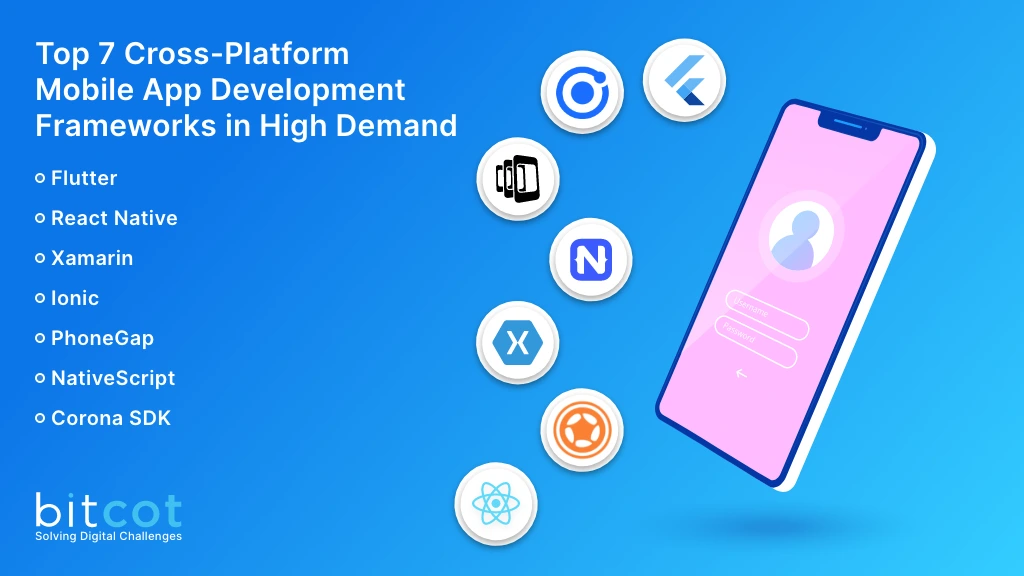
Cross-platform mobile app development frameworks have gained significant popularity in recent years, due to their ability to help businesses develop apps that can run seamlessly across multiple platforms. These frameworks offer several benefits, such as faster development time, lower costs, and wider reach. In this article, we will explore the top 7 cross-platform mobile app development frameworks that are in high demand today.
1. React Native
![]()
React Native is an open-source mobile app development framework developed by Facebook. It allows developers to use a single codebase to develop apps for both Android and iOS platforms. React Native offers several benefits, such as faster development time, better performance, and access to platform-specific features.
2. Xamarin
![]()
Xamarin is a popular cross-platform mobile app development framework that uses C# programming language and .NET framework. It allows developers to develop apps that can run on Android, iOS, and Windows platforms. Xamarin offers several benefits, such as easy integration with other Microsoft tools, access to native APIs, and better performance.
3. Flutter

Flutter is a cross-platform mobile app development framework developed by Google. It uses the Dart programming language and allows developers to develop apps that can run on both Android and iOS platforms. Flutter offers several benefits, such as faster development time, a rich set of pre-built widgets, and hot-reload feature for fast iteration.
4.Ionic

Ionic is an open-source cross-platform mobile app development framework that uses web technologies such as HTML, CSS, and JavaScript. It allows developers to develop apps that can run on Android, iOS, and the web. Ionic offers several benefits, such as easy integration with AngularJS, a rich set of pre-built UI components, and easy customization.
5. PhoneGap

PhoneGap is a popular open-source cross-platform mobile app development framework developed by Adobe. It uses web technologies such as HTML, CSS, and JavaScript, and allows developers to develop apps that can run on Android, iOS, and other platforms. PhoneGap offers several benefits, such as easy integration with other Adobe tools, access to native APIs, and a large community of developers.
6. Native Script

NativeScript is an open-source cross-platform mobile app development framework developed by Progress. It uses JavaScript and allows developers to develop apps that can run on both Android and iOS platforms. NativeScript offers several benefits, such as easy integration with AngularJS and Vue.js, access to native APIs, and better performance.
7. Corona SDK

Corona SDK is a popular cross-platform mobile app development framework that uses Lua programming language. It allows developers to develop apps that can run on both Android and iOS platforms. Corona SDK offers several benefits, such as fast development time, access to native APIs, and a large community of developers.
Cross-platform mobile app development frameworks offer several benefits for businesses developing mobile apps for multiple platforms. Developers can choose from various frameworks based on their specific needs, such as development time, performance, and access to native APIs. By leveraging the benefits of cross-platform mobile app development frameworks, businesses can develop cost-effective and efficient mobile solutions that meet the needs of their target audience.
Conclusion
The limitations of cross-platform development solutions are becoming less significant as they continue to evolve, and the benefits they offer are increasingly evident. Various technologies are available on the market, each tailored to different workflows and requirements. This article covers different tools that extensively support teams considering cross-platform development.
BitCot offers extensive cross-platform mobile app development services, comprising consulting, coding, re-platforming, support, and maintenance. Our team develops customized mobile solutions that cater to every client’s individual needs. We ensure our clients receive the best-suited product that caters to their requirements and functions seamlessly.
Feel free to contact our professionals to gather additional details, and they will guide you in initiating your project for cross-platform mobile app development.
FAQs About Cross Platform App Development
Q: What is cross-platform mobile app development?
Cross-platform mobile app development is the process of developing mobile applications that can run seamlessly on multiple operating systems using a single codebase.
Q: What are the benefits of cross-platform mobile app development?
The benefits of cross-platform mobile app development include faster development time, lower costs, wider reach, easier maintenance, and consistent user experience across different platforms.
Q: Which programming languages are used in cross-platform mobile app development?
Several programming languages are used in cross-platform mobile app development, including JavaScript, HTML, CSS, C#, Dart, and Lua.
Q: Which are the top cross-platform mobile app development frameworks?
The top cross-platform mobile app development frameworks include React Native, Xamarin, Flutter, Ionic, PhoneGap, NativeScript, and Corona SDK.
Q: Is cross-platform mobile app development suitable for all types of businesses?
Cross-platform mobile app development is suitable for businesses of all sizes and types. However, it is crucial to consider specific business needs, budget, and timeline before deciding whether cross-platform development is the right approach.
Q: How can I hire a cross-platform mobile app development team?
You can hire a cross-platform mobile app development team by contacting a reliable software development company offering cross-platform mobile app development services.
Q: What are some of the challenges of cross-platform mobile app development?
Cross-platform mobile app development challenges include limited access to platform-specific features, potential performance issues, and the need to ensure compatibility across multiple platforms.
Q: What are some considerations when choosing a cross-platform mobile app development framework?
When selecting a cross-platform mobile app development framework, it is essential to consider factors such as development time, performance, ease of use, available features, and community support.
Q: How long does it take to develop a cross-platform mobile app?
The development time for a cross-platform mobile app varies based on factors such as app complexity, required features, and team size. However, cross-platform development generally takes less time than developing separate native apps for each platform.
Q: What is the cost of cross-platform mobile app development?
A: Cross-platform mobile app development costs vary based on factors such as app complexity, required features, and team size. However, cross-platform development is generally less expensive than developing separate native apps for each platform.




